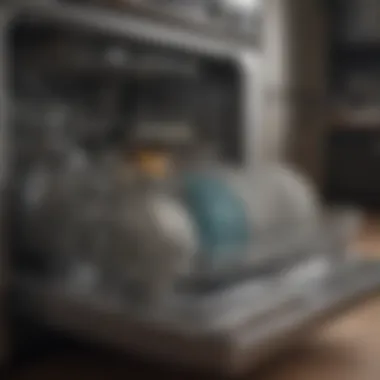Essential Guide to Cleaning Your Dishwasher


Intro
This article explores the best methods for cleaning your dishwasher, providing step-by-step guidance and covering essential techniques that you can apply to maintain your unit. Additionally, it highlights the tools required, how often cleaning should occur, and preventative measures to avoid the buildup of unwanted materials. By the end, you should feel equipped to tackle this task and ensure your appliance operates optimally.
Understanding the Importance of Cleaning Your Dishwasher
Maintaining a clean dishwasher is often disregarded, but it plays a significant role in the overall functionality of the appliance. Many users may not realize how neglecting this task can lead to problems. It's essential to understand the various benefits and considerations regarding the cleaning of a dishwasher. The following sections will clarify the impact it has on both performance and health.
Impact on Performance
A clean dishwasher operates more effectively. Food particles, grime, and grease can accumulate over time, hindering the performance of the machine. When filters are clogged, water circulation is reduced, leading to inefficient cleaning. This can result in dishes not being cleaned properly, necessitating repeated cycles that consume more water and energy. Regular cleaning helps maintain optimal water flow and ensures that the heating elements function as intended. Furthermore, addressing buildups promptly can extend the appliance's lifespan. This proactive approach prevents the need for costly repairs or replacements down the line.
Health Implications
Health issues can arise from a dirty dishwasher. Bacteria thrive in moist, unclean environments, and a neglected dishwasher can become a breeding ground for germs and other pathogens. When dishes are washed in such a machine, there is a risk of transferring these harmful microorganisms to utensils and plates. This is particularly concerning for families with young children or individuals with compromised immune systems. Moreover, persistent odors may develop from mold or mildew, which can affect the air quality in your kitchen. By ensuring regular cleaning, you mitigate these health risks significantly. A clean appliance not only enhances performance but also promotes a healthier living environment.
Tools and Materials Needed for Cleaning
Cleaning your dishwasher effectively requires the right tools and materials. This not only makes the task easier but also ensures that all areas of the appliance are properly addressed. Having the correct supplies can significantly enhance the efficiency of the cleaning process and contribute to the appliance's longevity. Moreover, using appropriate materials prevents damage to the dishwasher's surfaces and components.
Basic Cleaning Supplies
White Vinegar
White vinegar is a powerful natural cleaner. It works effectively to combat hard water stains and mineral buildup. Its acidic nature breaks down grime found inside the dishwasher. White vinegar is a popular choice for many because it is readily available and environmentally friendly. When using white vinegar, ensure that it is placed in a dishwasher-safe container during a cleaning cycle. This unique property allows it to circulate effectively throughout the appliance, reaching otherwise hard-to-clean areas.
Baking Soda
Baking soda is another highly effective cleaning agent. It is a gentle abrasive, which makes it perfect for scrubbing away stubborn spots without scratching surfaces. Additionally, baking soda helps neutralize odors, leaving a fresh scent in its wake. This substance is ideal after running a cycle with white vinegar, as it enhances the overall cleaning effect. One should remember to use baking soda sparingly, as too much can lead to buildup in the appliance.
Soft Cloths and Sponges
Soft cloths and sponges are essential for wiping down surfaces inside the dishwasher. Using non-abrasive materials helps prevent scratches on the interior surfaces while effectively removing remaining moisture and grime. They can be used to apply the cleaning solutions mentioned above, ensuring that all areas are evenly cleaned. Choose cloths that are durable to withstand multiple cleaning sessions, as they can wear out quickly.
Optional Cleaning Devices
Toothbrush
An old toothbrush is surprisingly useful for reaching tight spaces. Its bristles provide detailed scrubbing, especially around spray arms and filter areas. This tool is particularly beneficial for cleaning small crevices and corners. Many people appreciate the fact that a toothbrush is safe to use with most cleaning solutions. However, one should be cautious about using it on very delicate parts to prevent scratching.
Scraper
A scraper is handy for removing stubborn debris and buildup. Especially useful in the filter and drain areas, it can remove caked-on grime effectively without excessive force. A non-metal scraper is preferred to avoid scratching. While it is a great tool for tougher jobs, one must ensure not to apply too much pressure to prevent damaging internal components.


Jet Nozzle Cleaner
A jet nozzle cleaner is designed for targeting hard-to-reach spots such as spray arms. Its capability to focus on a small area makes it effective for clearing blockages and ensuring proper water flow. This device allows for an efficient cleaning cycle without taking apart the dishwasher. Although very effective, it requires proper handling to avoid damaging sensitive parts.
Keep in mind: Proper tools ensure that your cleaning efforts have the desired outcome and keep your dishwasher functioning well over time.
Initial Preparations Before Cleaning
Before you initiate the cleaning of your dishwasher, it is vital to undertake initial preparations. These steps lay the groundwork for an effective cleaning process. They ensure that you address potential issues and make the entire task simpler and more efficient. Proper preparatory actions can enhance the cleaner's effectiveness and prolong the dishwasher's lifespan.
Remove Dishes and Utensils
Removing all dishes and utensils is the first step. This action is not just about clearing space, but more about preventing future messes. Leftover food particles can hinder the cleaning process and may even lead to unpleasant odors. Without clearance, dirt may get trapped in various areas during the cleaning cycle.
Check for Blockages
Conducting a thorough inspection for blockages is crucial before moving forward with cleaning. Noticing clogs or obstructions can save you from significant problems down the line, ensuring that the dishwasher functions properly after cleaning.
Inspect the Drain
A critical aspect of checking for blockages is inspecting the drain. A clear drain is essential to the performance of the dishwasher. If the drain is blocked, it can lead to water pooling at the bottom, resulting in inefficient cleaning or even damage to the machine. Removing any food debris or buildup from the drain aids in proper water flow and enhances the dishwasher's efficiency. This may seem basic, but it is often overlooked.
Check the Spray Arms
Another important component to examine is the spray arms. These are responsible for distributing water during the wash cycle. If they are blocked or damaged, the water distribution will be uneven, and dishes may not be cleaned thoroughly. Checking the spray arms can help identify issues early, saving you from further maintenance effort later. Ensuring they are free of obstruction is crucial for optimal performance.
Step-by-Step Cleaning Process
Cleaning your dishwasher is not simply an optional task but rather an essential process to ensure the appliance functions efficiently. Over time, residue and food particles can accumulate, leading to diminished performance and even unpleasant odors. Moreover, a well-maintained dishwasher can extend its service life, protecting your investment. This section will provide clear, actionable steps to follow, ensuring you are equipped to achieve optimal cleanliness in your dishwasher.
Cleaning the Filter
The filter is a critical component of the dishwasher that traps food particles and debris. Regularly cleaning the filter helps prevent clogs and blockages, which can cause water not to drain properly. To clean it, first remove the bottom rack. Locate the filter, twist it out carefully, and rinse it under warm water. A soft brush can help eliminate any stubborn food particles. Let it air dry before placing it back securely.
Wiping Down the Interior
Over time, the interior of your dishwasher can become grimy. Wiping it down regularly prevents buildup that can affect performance. Use a soft cloth dampened with warm soapy water to clean the walls and door seals. Pay attention to corners where grime can accumulate. Rinsing with clean water afterwards will remove any soap residue. This simple task keeps your dishwasher looking clean and functioning well.
Cleaning the Spray Arms
The spray arms distribute water to clean your dishes. If they become blocked, it can reduce cleaning effectiveness. To clean them, simply remove the spray arms by unfastening them. Use a toothbrush or a soft cloth to clear any obstructions in the holes. Make sure to rinse them thoroughly before reinstalling them. This maintenance step ensures proper water flow and better cleaning results.
Running a Cleaning Cycle
Running a dedicated cleaning cycle can remove built-up deposits and enhance cleanliness. This step is crucial for deep cleaning your dishwasher, providing a fresh environment for your dishes.


Using Vinegar
Using vinegar is an effective and natural way to clean your dishwasher. Vinegar is a powerful acid that helps dissolve mineral deposits and grease. To use it, simply place a cup of white vinegar in a dishwasher-safe container on the top rack. Run a hot water cycle, and the vinegar will break down residues along the interior surfaces. It is a popular choice for its cost-effectiveness and non-toxic nature. However, using vinegar too frequently may wear down rubber seals over time, so moderation is key.
Using Baking Soda
Baking soda serves as another excellent cleaning agent for dishwashers. It works by neutralizing odors and providing gentle abrasiveness that can tackle tough stains. After running a vinegar cycle, sprinkle about a cup of baking soda across the bottom of the dishwasher. Run a short hot water cycle, and it will refresh the interior while removing any lingering griminess. Baking soda is also a non-toxic option, making it safe to use frequently. However, it might not be as effective on heavy buildups compared to vinegar.
Cleaning your dishwasher with these methods ensures a hygienic appliance that lasts longer and functions at its best.
Dealing with Odors
Cleaning your dishwasher is not just about removing grease and grime; dealing with odors is equally important. Over time, dishwashers can develop unpleasant smells that may transfer to your clean dishes. Understanding the causes and implementing preventative measures can enhance the performance of your appliance and improve your kitchen environment.
Common Causes of Odor
There are several reasons why your dishwasher might smell. One common cause is food particles that remain stuck in the filter or spray arms. When these bits decompose, they produce a bad odor. Another factor can be the buildup of mold and mildew, which thrives in damp environments. If the dishwasher is not draining properly, stagnant water can also lead to foul smells. Inadequate cleaning routines or occasional use can amplify these issues, as the environment remains conducive to unpleasant odors.
Preventative Measures
To combat odors effectively, regular maintenance is key. Here are some practical tips:
- Clean the Filter Weekly: Remove and rinse the filter to eliminate trapped food debris. Consider soaking it in hot, soapy water if there are stubborn bits.
- Run Empty Cycles with Vinegar: Monthly, consider running an empty cycle with a cup of white vinegar placed in the top rack. This helps neutralize odors and break down any grease buildup.
- Wipe Down Seals and Edges: Use a damp cloth to clean the door seals and edges of the dishwasher. This area often collects residue and mold.
- Leave the Door Ajar: After each use, leave the dishwasher door slightly open. This allows moisture to escape and helps prevent mold and mildew growth.
Taking these simple steps can greatly contribute to a more pleasant environment in your kitchen and prolong the life of your dishwasher.
Maintaining Your Dishwasher for Longevity
Maintaining your dishwasher is crucial for its optimal performance and longevity. Regular maintenance not only ensures that the appliance operates efficiently, but it can also prevent costly repairs. By focusing on specific elements such as the frequency of cleaning and routine maintenance checks, users can enhance the lifespan and effectiveness of their dishwasher.
Frequency of Cleaning
Cleaning your dishwasher is not a one-time event. It requires a consistent schedule to prevent the buildup of grime and odors. It is recommended to perform a deep cleaning every one to three months, depending on usage. For households that frequently run their dishwasher, a monthly cleaning may be necessary.
Regular cleaning helps to address issues such as:
- Clogged filters: Food debris can accumulate, affecting water flow.
- Buildup of soap scum: This can impact the efficiency of detergent.
- Odor production: Residual food particles can cause foul smells.
Incorporating simple cleaning tasks, such as wiping down the interior and inspecting the spray arms, as part of weekly routine ensures that the appliance remains in good working condition.
Routine Maintenance Checks
Routine maintenance checks are an essential aspect of long-term dishwasher maintenance. Performing these checks can prevent minor issues from becoming significant problems.
Inspecting Components


Inspecting components is vital to maintaining a functioning dishwasher. This involves checking the filter, spray arms, and door seals. Each component plays a role in how effectively the dishwasher operates.
- Key Characteristics: Regular inspections allow for early detection of clogs or damage, which can hinder performance.
- Benefits: This proactive approach ensures that small issues do not escalate, thus saving time and money.
- Unique Feature: The ability to notice wear early contributes to the overall efficiency of the dishwasher, supporting its longevity.
This kind of vigilance is common among skilled users who understand the importance of keeping their appliances in peak condition.
Identifying Wear and Tear
Identifying wear and tear is another critical maintenance task. Over time, parts such as the gasket and spray arms can degrade. Understanding when these components need attention can enhance the effectiveness of your appliance.
- Key Characteristics: Visual inspection can catch problems before they result in leaks or other functional issues.
- Benefits: By recognizing wear, users can plan for repairs or replacements, delaying the need to purchase a new appliance.
- Unique Feature: This process allows users to maintain control over the upkeep of their units, extending useful life and effectiveness.
Overall, maintaining your dishwasher through regular cleaning and inspections contributes to its efficiency and longevity. This proactive approach saves on utility and repair costs, ultimately protecting your investment.
When to Seek Professional Help
In the journey of maintaining a dishwasher, there arise moments when the task transcends simple cleaning techniques. Understanding when to seek professional assistance is a crucial aspect of effective dishwasher care. Often, users might experience issues that require a specialist's insight. Recognizing these situations can save time and prevent further damage to the appliance.
Professional help brings expertise that homeowners may lack. Experts can diagnose deeper mechanical problems that a conventional cleaning might not resolve. They possess the tools, knowledge, and experience to handle complex issues safely and effectively.
Signs of Malfunction
Recognizing signs of malfunction is paramount. There are several indicators that may suggest it's time to contact a professional:
- Unusual Noises: If your dishwasher begins to produce strange sounds like grinding or rattling, it usually indicates that a component has become loose or damaged.
- Persistent Error Codes: Modern dishwashers often have error codes that can signify internal mistakes or malfunctions. If you notice these persistently, professional diagnostics may be necessary.
- Water Leakage: Any signs of water leaking from the base of the dishwasher require immediate attention. This could lead to more serious problems, such as water damage.
- Failure to Clean: When dishes remain dirty despite a full cycle, it may suggest that the spray arms or filter are clogged or that there's a problem with the pump itself.
Proactively addressing these signs can enhance the longevity of your appliance and maintain its function.
Complex Cleaning Issues
Complex cleaning issues can arise from neglect or unusual circumstances. These scenarios often demand a professional's touch:
- Clogged Drainage System: A drainage system that refuses to clear might require a professional's tools to inspect and resolve deeper blockages.
- Faulty Spray Arms: When spray arms fail to spin properly, they can stop dishes from receiving necessary water pressure. A professional can ascertain whether cleaning can restore function or if replacement is needed.
- Mold and Mildew Growth: If there is a persistent problem with mold or mildew, despite cleaning attempts, a thorough examination by an expert might be warranted to eliminate the source effectively.
Seeking professional help does not mean you have failed at maintenance; instead, it signifies taking a responsible step toward sustaining your appliance's performance.
Closure
Cleaning your dishwasher is more than just a chore; it is essential for the performance and longevity of the appliance. Regular maintenance offers several benefits, including improved efficiency and a reduced risk of malfunctions. This article has detailed how to clean your dishwasher properly, addressing the necessary tools, step-by-step procedures, and ongoing maintenance practices.
By keeping your dishwasher clean, you are also promoting a healthier kitchen environment. The buildup of grime, mold, and odors can be detrimental to both the appliance and your overall home. Maintaining cleanliness helps avoid unpleasant smells and ensures that your dishes come out sparkling clean.
Considerations for cleaning should include frequency and thoroughness. Simple steps like running a vinegar rinse every month can go a long way in preventing issues. Likewise, addressing any signs of malfunction early can save time and money in future repairs.
In summary, an effectively cleaned dishwasher not only enhances performance but also contributes to a healthier living space. Emphasizing this routine will make your cleaning efforts more worthwhile, sustaining your appliance's functionality for years to come. Regular attention to this household item can lead to significant benefits in terms of hygiene, efficiency, and peace of mind.
"A clean dishwasher is a happy dishwasher."
Taking proactive measures to clean your dishwasher can transform a mundane task into an investment in your kitchen's functionality and your well-being.
By adopting the strategies outlined in this article, you ensure that your dishwasher serves you well, washing dishes to perfection. Embrace this knowledge, and let it empower your cleaning routines.







